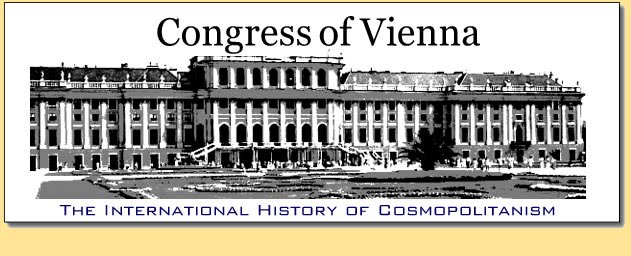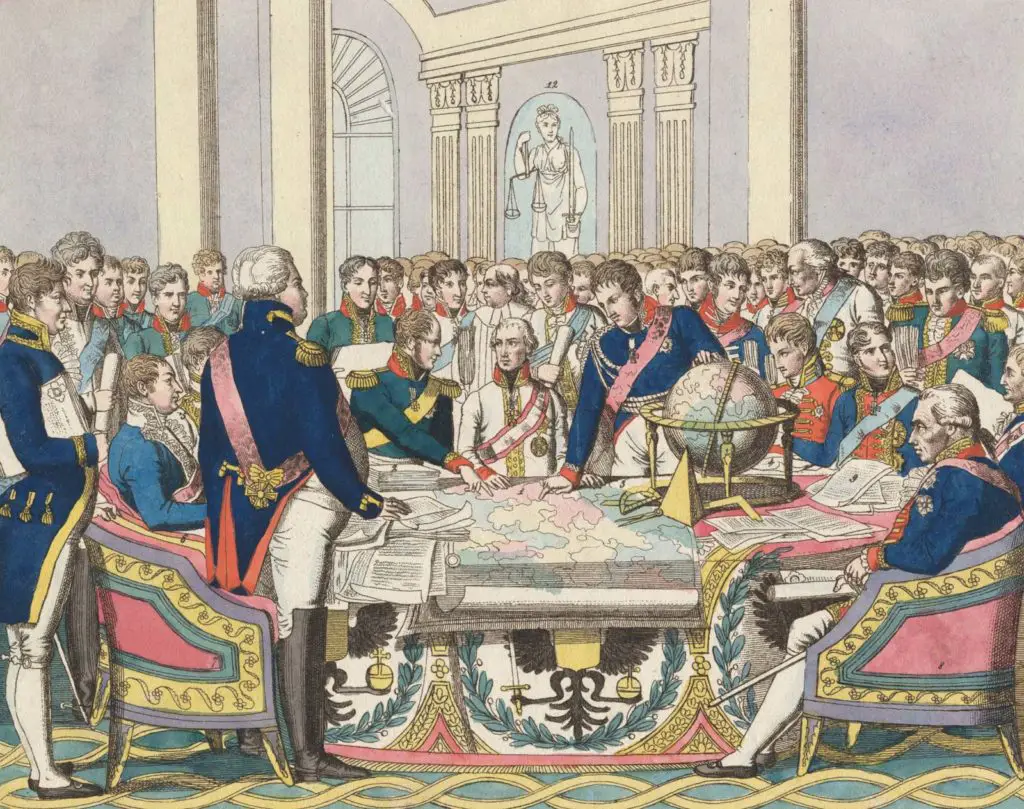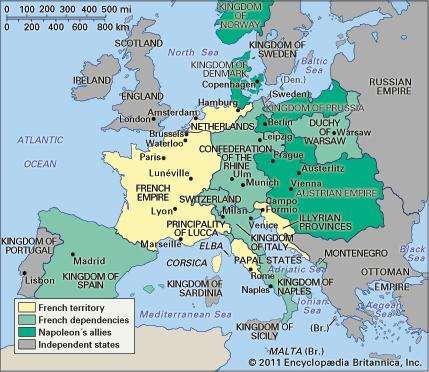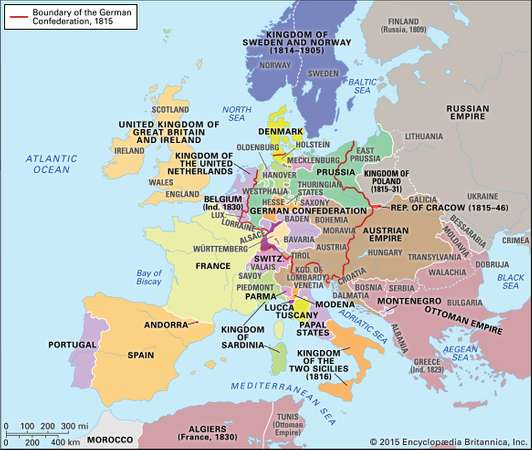
The Congress of Vienna (series of meetings in Vienna) was held from September 1814 to June 1815. After the downfall of Napoleon, Europe was in a state of chaos and it needed re-organization. Thus the Congress of Vienna came into force.
The individuals from the Congress were all scared of a solid France, so they created outskirt states. The Netherlands and the Italian Kingdom of Piedmont were built. Prussia got the left bank of the Rhine, while Austria took an area in Northern Italy, including Tuscany and Milan.
In Naples, Murat really kept his position of authority for some time. The Bourbons were re-established in Spain. Re-establishing Germany to its past status as the riotous, divided Holy Roman Empire filled nobody’s needs.
Rather, the moderately expansive kingdoms of Bavaria, Wurttemberg, and Saxony stayed as Napoleon made them. Be that as it may, no unified Germany would come forward.
The fate of Napoleon’s Polish Grand Duchy of Warsaw remained the trickiest issue. Alexander had wanted over the domain for quite a long time, yet Austria and Prussia both had pieces of the old Polish kingdom.
The Prussians entered a concurrence with Russia, under which Russia would bolster Prussia’s offer for Saxony and Prussia would bolster Russia’s offer for Poland; what’s more, Prussia would hand over a lot of Poland to Russian.

Metternich’s role in the Congress of Vienna
In European history, Klemens Von Metternich, the foreign minister of Austria had played a significant role in establishing international diplomacy. Metternich, in any case, expected that Russia would turn out to be excessively amazing in this arrangement. To battle the Russian-Prussian coalition, on January 3, 1815, Metternich, Castlereagh, and Talleyrand marked a mystery settlement consenting to contradict the Prussians and Russians.
At last, the Congress of Vienna made a little Poland (“Congress Poland”) with Alexander introduced as the lord. With Russia fulfilled, Prussia lost its partner and just had the capacity to get a minor bit of Saxony.
As these subtleties were being resolved in Vienna, another issue abruptly emerged. On March 1, 1815, Napoleon showed up in France, having gotten away from outcast in Elba. Promising to return France to brilliance, Napoleon cleared through the nation and raised a military.
Louis XVIII immediately fled, and Napoleon attempted at success in a period called the Hundred Days. The Congress of Vienna was stunned and promptly proclaimed Napoleon as an outlaw.
The Hundred Days reached peak and resolution at the Battle of Waterloo, where the British armed force under Wellington was joined by a revived Prussian power under Blucher. Together, the British and the Prussians figured out how to vanquish Napoleon.
The second Treaty of Paris was marked, and Napoleon was ousted a lot more remote away this time, to the island of Saint Helena in the South Atlantic, where he experienced the last six years of his life.
The four successful forces (Britain, Austria, Prussia, Russia) concurred that no Bonaparte could ever be permitted to govern France again. Indeed, even Murat, who recently had been left as lord of Naples, was currently removed and the Bourbon government re-established.
After the finish of the Hundred Days, the completing contacts were put on the Congress of Vienna. Czar Alexander I was searching for an aggregate security framework that would keep anybody from regularly building such an extensive European domain once more, persuaded most European countries to sign a Holy Alliance. Under the terms of this understanding, this was paid enough attention including Alexander himself, all the nations had promised and decided to abide by the Christian ideals of charity, peace, and harmony.


What were the three main goals of Congress of Vienna?
Metternich had set three main goals for the Congress of Vienna.
First of all, he wanted to prevent French aggression in the future by surrounding France with strong countries. Secondly, he wanted to restore balance in power in such a way that no country could threaten Europe, and thirdly he wanted to restore Europe’s royal families back to the throne which they used to hold before Napoleon’s conquest.
Congress of Vienna Effects
The Congress of Vienna was a standout amongst the most vital universal summits of European history; it decided the future limits of Europe, limits that still affect Europe today. The significant forces of the day ruled arrangements, sending their most famous statesman. Klemens Von Metternich had arrived from Austra, Robert Stewart Castlereagh from Britain had arrived.
Alexander I had arrived from Russia, Karl August Von Hardenberg had arrived from Prussia, and Charles Maurice de Talleyrand Perigord had arrived from France had sent Talleyrand. Each had country had its own objectives. Prussia needed to develop its region. Russia needed Poland, yet it additionally needed aggregate security.
What’s more, Austria and Britain basically needed an equalization of intensity that would keep up strength and the present state of affairs in Europe. Despite the fact that the French Revolution and Napoleonic Rule spread the powers of modernization and change, the Congress of Vienna, which decided the eventual fate of Europe past Napoleon, was ruled by individuals from the old routine and gentry. Their expectation was to plan a political scene wherein nobody power could overwhelm.
The mystery Austrian-British-French collusion to prevent Russia and Prussia from consolidating to increase all of Poland and Saxony just shows how entangled the dealings were. Europe had quite recently gone through two decades managing the French danger, and as of now, the counter French alliance was part up, with Britain really aligning with France.
In any case, in spite of the endeavors to limit Russian and Prussian infringement in Central Europe, the two nations managed to expand their impact west through the Congress of Vienna.
The Congress of Vienna additionally prohibits the Atlantic slave exchange. The majority of the significant forces consented to this, yet just Britain really successfully stopped the exchange, setting up an enemy of slaving maritime squadron.
Was the Congress of Vienna successful?
In several ways, the Congress of Vienna was a political triumph. For the very first time, all the nations of the continent had collaborated together and started working to control political affairs. The settlements on which they agreed upon were pretty fair enough, leaving no country to have a grudge on Europe. Thus this means there is no scope for future wars.
When each nation decided to come and help each other in case of external threats, The Congress of Vienna came into being for establishing peace in Europe. After this, until the next 40 years, no wars were noted to occur in Europe. Thus in history, it is one of the most successful and peaceful meetings.
How did the Congress of Vienna affect France?
For all the inconvenience France had caused, the Congress was amazingly mellow towards France, which essentially got the chance to keep its conventional, pre-Revolution limits. The Congress likewise prevented conceivably dangerous issues from escaping hand: the Poland issue could have prompted war or further antagonistic vibe, yet it was taken care of with outrageous consideration by a gathering of entirely able negotiators.
The Congress splendidly settled long haul security in Europe. Valid, there were a few reactions. Patriots were not constantly content with the setup outskirts that served to keep up the equalization of intensity as opposed to bringing together a given gathering that mutual a similar language and culture.
Likewise, the dependability the Congress made helped keep reactionary routines in power and may have hindered social advancement, and a great part of the years somewhere in the range of 1815 and 1848 were energized by the communication of liberal and traditionalist standards.
Be that as it may, on the whole, the Congress of Vienna was a triumph. It sufficiently made forces of comparable quality and impact that none of them could go excessively far without being overpowered by an alliance of the others. It intervened various pressures and clashing enthusiasm through quiet arrangements.
Besides, Congress made so minimal hard inclination and question that the entire of Europe did not all do battle on the double for a century. Not until World War I broke out in 1914 completed a monstrous, Europe-wide clash happen. In that sense, the Congress of Vienna was a triumph of tact.
What did Russia want in the Congress of Vienna?
Russia was one of the four powers (Britain, Austria, and Prussia) who was successful in defeating Napoleon and had exiled him. Russia wanted that in France, no Bonaparte should ever be allowed to rule again. Alexander I of Russia made all other nations of Europe sign the Holy Alliance and it was taken significantly by most. Apart from this, Russia also had the interest to take over Poland.